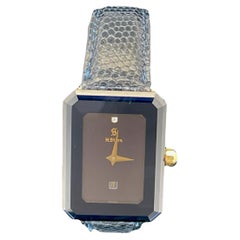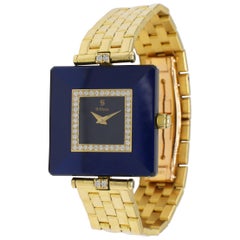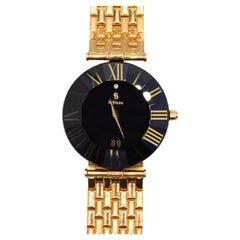Stern Sapphire Watch
21st Century and Contemporary Wrist Watches
Diamond, Quartz, Sapphire, 18k Gold, Yellow Gold
Recent Sales
Late 20th Century Wrist Watches
Diamond, Blue Sapphire, 18k Gold, Yellow Gold
Late 20th Century Wrist Watches
Sapphire, Yellow Gold, 18k Gold
Early 2000s Wrist Watches
Diamond, Sapphire, Yellow Gold
Stainless Steel, 18k Gold
1990s Swiss Wrist Watches
Sapphire, 18k Gold
People Also Browsed
Vintage 1970s Unknown Wrist Watches
Diamond, Lapis Lazuli, 18k Gold, White Gold
Vintage 1980s Wrist Watches
Gold, 18k Gold, Stainless Steel
20th Century Swiss Modern Wrist Watches
18k Gold, Yellow Gold
20th Century Wrist Watches
Vintage 1980s French Wrist Watches
Pearl, Yellow Gold
20th Century Wrist Watches
Diamond, 18k Gold
21st Century and Contemporary Wrist Watches
Diamond, Emerald, Gold, 18k Gold, Yellow Gold
1990s American Fashion Rings
Citrine, 18k Gold
Mid-20th Century Swiss Modern Wrist Watches
Gold, 18k Gold
Vintage 1960s Swiss Wrist Watches
18k Gold, Yellow Gold
Vintage 1970s French Modern Wrist Watches
Sterling Silver
21st Century and Contemporary Swiss Modern Wrist Watches
18k Gold, Yellow Gold
Early 2000s French Wrist Watches
Steel, Gilt Metal
Vintage 1920s Swiss Art Deco Wrist Watches
Diamond, Sapphire, Platinum
21st Century and Contemporary American Artisan Wrist Watches
Pearl, Ruby, Yellow Gold, Gold, 14k Gold
21st Century and Contemporary Modern Wrist Watches
Diamond, Quartz, 18k Gold, Yellow Gold
H. Stern for sale on 1stDibs
Born into a Jewish family in Essen, Germany, Hans Stern (1922–2007) fled with his parents to Rio de Janeiro at the onset of World War II. There he landed a job working for the precious stone and mineral exporter Cristab. Thus began Stern’s rise to become “the king of the colored gems,” as the media would dub him, and founder of the family-owned H.Stern jewelry business that now has over 150 stores worldwide.
While working for Cristab, Stern regularly visited mines on horseback. At the remote mines of Minas Gerais, Brazil, he cultivated relationships with many of the miners, developing professional connections that would endure for decades. He also embraced a fascination with the colorful semiprecious stones harvested in the area. In 1945, he started his own company, H.Stern, with the goal of marketing Brazilian gemstones — then virtually unknown on the global stage — to an international audience.
Though the company began as a trader in gemstones, it soon expanded to jewelry, with Stern assembling and training a team of young jewelers. A frequent motif in the company’s designs was the star, as Stern is “star” in German. In 1949, H.Stern opened its first jewelry shop in Rio de Janeiro, but a storefront was not his customers’ only view into the brand’s jewelry-making process. In the 1950s, Stern became one of the first major jewelers to offer tours of his workshop, showing off the creative process and elevating the role of craftsmanship in jewelry design.
Stern’s approach and his vibrant jewels, which favored organic settings designed to show off colorful gems, earned international recognition and put Brazil’s topaz, amethyst and tourmaline on the map. Tourmaline was reportedly Stern’s favorite, and the company’s Rio de Janeiro vaults are also home to Paraíba tourmalines, which are mined in the mountains of Paraíba, Brazil. He recognized the burgeoning tourism industry in the country as an opportunity to promote the beauty of these stones, opening stores in the lobbies of Brazil’s leading hotels and investing in vehicles to bring visitors to the H.Stern headquarters. By the mid-1990s, the company was opening stores abroad and selling jewelry at international department stores.
In the 1980s, the brand debuted its first celebrity collaboration, with French actress Catherine Deneuve. Since then it has worked with partners such as designer Diane von Fürstenberg and architect Oscar Niemeyer. In 2016, Assouline published a book on the 70-year history of H.Stern, from its humble founding to its worldwide acclaim. Today, the company is run by Stern’s son, Roberto, who has introduced a broad range of new collections and styles.
On 1stDibs, find a collection of H. Stern necklaces, rings, earrings and other accessories.
Why Gold Shines in Jewelry Craftsmanship
Gold is the feel-good metal, the serotonin of jewelry. Wear vintage and antique gold necklaces, watches, gold bracelets or gold rings and you feel happy, you feel dressed, you feel, well, yourself.
Gold, especially yellow gold, with its rich patina and ancient pedigree going back thousands of years, is the steady standby, the well-mannered metal of choice. Any discussion of this lustrous metal comes down to a basic truth: Gold is elementary, my dear. Gold jewelry that couples the mystique of the metal with superb design and craftsmanship achieves the status of an enduring classic. Many luxury houses have given us some of our most treasured and lasting examples of gold jewelry over the years.
Since its founding, in 1837, Tiffany & Co. has built its reputation on its company jewelry as well as its coterie of boutique designers, which has included Jean Schlumberger, Donald Claflin, Angela Cummings and Elsa Peretti. There are numerous gold Tiffany classics worth citing. Some are accented with gemstones, but all stand out for their design and the workmanship displayed.
For the woman who prefers a minimalist look, the Tiffany & Co. twist bangle (thin, slightly ovoid) is stylishly simple. For Cummings devotees, signature pieces feature hard stone inlay, such as her pairs of gold ear clips inlaid with black jade (a play on the classic Chanel black and tan), or bangles whose design recalls ocean waves, with undulating lines of lapis lazuli and mother-of-pearl. And just about any design by the great Jean Schlumberger is by definition a classic.
Even had he eschewed stones and diamonds, Southern-born David Webb would be hailed for the vast arsenal of heavy gold jewelry he designed. Gold, usually hammered or textured in some manner, defines great David Webb jewelry. The self-taught jeweler made very au courant pieces while drawing inspiration from ancient and out-of-the-way sources — East meets West in the commanding gold necklaces made by Webb in the early 1970s. The same could be said for his endlessly varied gold cuffs.
In Europe, many houses have given us gold jewelry that sets the highest standard for excellence, pieces that were highly sought after when they were made and continue to be so.
Numerous designs from Cartier are homages to gold. There are the classic Trinity rings, necklaces and bracelets — trifectas of yellow, white and rose gold. As a testament to the power of love, consider the endurance of the Cartier Love bracelet.
Aldo Cipullo, Cartier’s top in-house designer from the late 1960s into the early ’70s, made history in 1969 with the Love bracelet. Cipullo frequently said that the Love bracelet was born of a sleepless night contemplating a love affair gone wrong and his realization that “the only remnants he possessed of the romance were memories.” He distilled the urge to keep a loved one close into a slim 18-karat gold bangle.
BVLGARI and its coin jewelry, gemme nummarie, hit the jackpot when the line launched in the 1960s. The line has been perennially popular. BVLGARI coin jewelry features ancient Greek and Roman coins embedded in striking gold mounts, usually hung on thick link necklaces of varying lengths. In the 1970s, BVLGARI introduced the Tubogas line, most often made in yellow gold. The Tubogas watches are classics, and then there is the Serpenti, the house's outstanding snake-themed watches and bracelets.
A collection called Monete that incorporated the gold coins is one of several iconic BVLGARI lines that debuted in the 1970s and ’80s, catering to a new generation of empowered women. Just as designers like Halston and Yves Saint Laurent were popularizing fuss-free ready-to-wear fashion for women on the go, BVLGARI offered jewels to be lived in.
Since Van Cleef & Arpels opened its Place Vendôme doors in 1906, collection after collection of jewelry classics have enchanted the public. As predominantly expressed in a honeycomb of gold, there is the Ludo watch and accessories, circa the 1920s, and the golden Zip necklace, 1951, whose ingenious transformation of the traditional zipper was originally proposed by the Duchess of Windsor. Van Cleef's Alhambra, with its Moroccan motif, was introduced in 1968 and from the start its popularity pivoted on royalty and celebrity status. It remains one of VCA’s most popular and collected styles.
Mention must be made of Buccellati, whose name is synonymous with gold so finely spun that it suggests tapestry. The house’s many gold bracelets, typically embellished with a few or many diamonds, signified taste and distinction and are always in favor on the secondary market. Other important mid-20th-century houses known for their gold-themed jewelry include Hermès and Ilias Lalaounis.
Find a stunning collection of vintage and antique gold jewelry on 1stDibs.
The Legacy of Sapphire in Jewelry Design
On 1stDibs, shop the bright blue gems that star in sapphire rings, sapphire necklaces and other vintage and antique sapphire jewelry.
Sapphires — the stone of choice for Napoleon, Princess Diana and Elizabeth Taylor — have been a favorite of aristocrats and the well-to-do since the time of the Ancient Greeks.
Picture a sapphire. If the stone you conjure is a deep cornflower blue, you’re seeing only part of the picture. Although blue Kashmirs are considered the most valuable, sapphires come in every color except red. No matter the hue, this very special gem is rich in history and beloved by royals (FYI, Princess Diana and Kate Middleton share an 11-carat sapphire engagement ring), so September babies are in very noble company.
America’s version of royalty — old money and celebrities — have also shown a predilection for the blue stones. In 1940, John D. Rockefeller Jr. had Cartier mount a 62-carat sapphire he had bought from an Indian maharajah in a brooch for his first wife, Abby Aldrich Rockefeller; in 2001, the piece sold for a then-record of $3,031,000 at Christie’s New York.
The grand dame of jewelry, Elizabeth Taylor had a passion for the gems that her lovers were happy to indulge. Second husband Michael Wilding gave her an engagement ring set with a cabochon sapphire, while Richard Burton famously presented her with a BVLGARI sautoir set with diamonds and sapphires, including at its center a cabochon Burmese weighing 52.72 carats. One of the star lots in the sale of Taylor’s jewels at the Christie’s New York in 2011, it sold for $5,906,500.
You don’t have to have blue blood or a bulging bank account, however, to get an eyeful of this much-coveted gem. A number of outstanding examples reside in public collections.
The Smithsonian Museum of Natural History owns the 423-carat Logan sapphire, a gift from the Guggenheim family, and the Hall sapphire and diamond necklace, designed by Harry Winston and featuring 36 fine, well-matched cushion-cut Sri Lankan sapphires weighing a combined 195 carats. Also in the collection is the Bismarck sapphire necklace, designed by Cartier and sporting a central sapphire weighing 98.6 carats, which Mona Von Bismarck donated to the museum.
Sapphires are composed of corundum. Their color derives from trace elements, such as iron, titanium, chromium, copper or magnesium. When the trace element produces a ruby hue, the stone is called, what else, a ruby. (which is, as mentioned above, why sapphires cannot be red by definition).
The allure of large gemstones endures throughout the periods characterized as vintage, and sapphire features frequently in vintage engagement rings. (On 1stDibs, a range of buying guides can be found for those in the market for antique engagement rings, vintage engagement rings or Art Deco engagement rings.)
Find an exquisite collection of vintage and antique sapphire jewelry on 1stDibs.
Finding the Right Wrist-watches for You
Antique, vintage and luxury wristwatches have captured the hearts and minds of all manner of watch collectors as well as the watchmakers themselves — it's time you found your own.
Certain vintage watches for men and iconic watch designs for women are sought after not only because of their graceful proportions or innovative materials but also because of the illustrious histories of the houses that created them, histories that they stylishly embody.
Bulgari’s legendary Serpenti watch was on everyone’s list after the collection’s bold bracelet, which technically debuted after the timepiece, graced the wrist of actress Elizabeth Taylor. If anything, elaborately crafted timepieces — the unmistakably boxy silhouette of Cartier Tank watches, the elegant and minimal Calatrava designed by legendary Swiss house Patek Philippe — are even more effective than the shape we associate with traditional wristwatches.
Form watches — the all-encompassing moniker bestowed upon non-round watches — are making headlines and completing contemporary fashionable ensembles the world over. At the same time, both casual fans and careful collectors are drawn to the unbeatable charm of vintage styles, such as the icons designed by Omega that even James Bond can’t resist.
In the early days of watchmaking, watches were fragile enough that they necessitated protection from the elements. Now, wristwatches made of gold and steel can withstand the harshest climates — even 100 meters underwater, in the case of Rolex’s Submariner. Designer Gérald Genta, whose range of clients included Rolex, created for Audemars Piguet the first luxury sports timepiece to be made from stainless steel. First introduced in 1972, the Royal Oak was a perfect choice for blending the form and function that are now synonymous with sports watches.
Are you shopping for a wristwatch? It’s good to keep your needs as well as your specific personal style in mind: A smaller, subtle timepiece is a good fit for small wrists. When will you be wearing your new accessory? There’s a versatile model out there for everyday wear, while a rugged, feature-heavy watch is a safe bet if you’re prone to embarking on all-weather activities in the great outdoors.
Find antique, vintage and luxury wristwatches for sale on 1stDibs.


